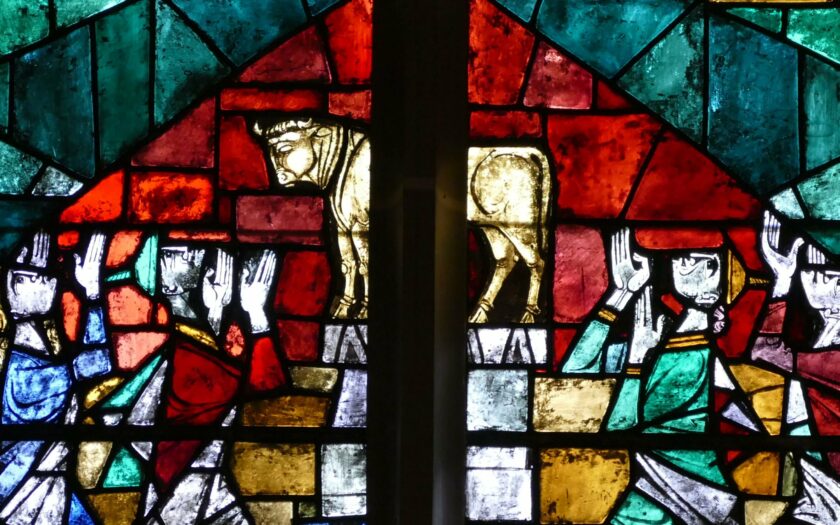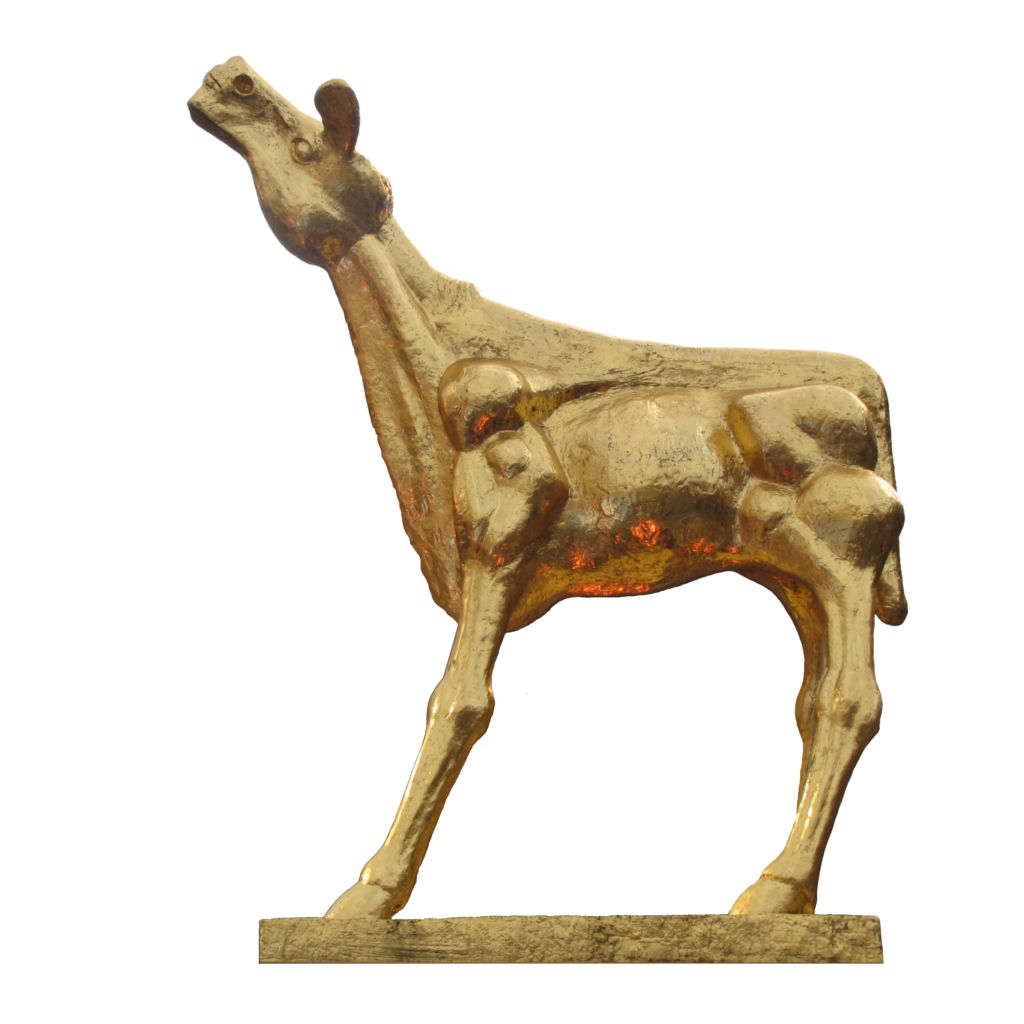Very recently I was asked by someone how it is that the Israelites of the golden calf said:These are your gods, Israel, who brought you out of the land of Egypt” (Exodus 32:4). The questioner sent a number of links to various articles with all kinds of views about the event, which apparently did not provide a convincing explanation for the questioner. So we're just trying to say something about it here. It is up to the questioner to decide whether this story ends up on the pile of 'inconclusive statements' or not.
The problem
So the question is how you can now name a calf as a god (or gods) and assign great divine power to it, while not so long ago you saw God's mighty action during the plagues in and exodus from Egypt. Then you have collectively gone mad or something else is going on.
The first possible explanation does not seem very plausible to me. Because if madness happened to them, they couldn't really do anything about it themselves, right? But why then did the Lord punish them so that 3,000 men had to die? The Lord God took it very seriously; just read the chapter. But then there must be another explanation.
They took their idols from Egypt
To begin with, we must realize that the people of Israel in Egypt already practiced idolatry. The Lord says this to Ezekiel when He compares the people of Israel with the two sisters Oholah and Oholiba. Their whole life is suffused with idolatry, which started in Egypt, where they spent 'their youth'.
“They committed fornication in Egypt; in their youth they committed fornication. . . . Nor did she give up her whoredoms with the Egyptians. For they had slept with her in her youth . . . Then I will put an end to your wickedness in you, and your fornication out of the land of Egypt. You will no longer lift up your eyes to them, and remember Egypt no more.”
Ezekiel 23:3,8, 19-21,27
Furthermore, with the people of Israel a large group of people 'of all kinds' had gone out of the land of Egypt (Exodus 12:38) and that did not really help – so to speak – to get rid of the idolatry.
In addition, it seems that they have been worshiping idols throughout the journey through the desert to the promised land.
“Have you offered me sacrifices and grain offerings in the wilderness for forty years, O house of Israel? Thou hast carried round Sikkut thy king, and Kewan thy images, the stars, thy gods, which thou hast made for thyself!”
Amos 5:25,26
In Stephen's speech it is even stated that the people of Israel no longer offered sacrifices to the Lord, but that He allowed them to serve idols.
“And they made a calf in those days and offered an offering to that idol, and they rejoiced in the works of their hands. And God turned away and gave them up to serve the host of heaven, as it is written in the book of the prophets: Did you also offer sacrifices and offerings to Me during the forty years in the wilderness, O house of Israel?”
Acts 7:41-42
These few quotes make it clear how things were with the people of God. Idolatry was from the beginning[1] already an ongoing problem; in Egypt, but also afterwards during the desert journey.
We usually think that the people served the Lord in the right way, but that image is not correct.
Where is the Lord God?
When the people are in Sinai and Moses is on the mountain, it takes too long for the people of Israel. In their opinion, Moses who led them out of Egypt is gone too long. We don't know if he's coming back. Then how should it proceed?
We can imagine that in the middle of that desert, where life is hard and difficult for the natural man, a kind of existential anguish came over them. If Moses is not there, then God will forsake us and we have a great chance of perishing here together.
In such a situation and with these kinds of emotions, people would like to reach out to 'god' so that he can let them know that 'everything will be fine'. We can well imagine this human need in itself, even if it is not in accordance with what the Lord God asks: faith and trust.
But the problem with this is that they fulfill their desire in a wrong way, a pagan way. They want to feel 'God', to experience Him inwardly, so that they know for sure that He has not left them.
This is your God, Israel
In chapter 32 we are presented with a bizarre mixture of the worship of the Lord with idolatry. Just think: Aaron says there's "tomorrow a feast for the Lord' is (verse 5) and indeed the day after they brought 'burnt offerings and peace offerings' (verse 6). But on the other hand, the people of the molten calf said,These are your gods, Israel, who brought you out of the land of Egypt." (verse 4) and the 'feast to the Lord' was misused to keep an immoral and pagan festival (verse 6b).
The people knew how to experience the nearness of God and they acted accordingly; including the rituals associated with it. As a result, they opened up to the demons in the invisible world[2], through which they experienced special internal experiences. In this state of higher consciousness (see here) changes perception and views. That the people of Israel in this condition come to the statement 'These are your gods, Israel, who brought you out of the land of Egypt' is certainly understandable. The image was for them the entrance to the invisible world through which deep inner emotions were aroused, which they experienced as 'God'.
The questioner sent along a few sites with possible explanations of what happened at Sinai and on only one of them - a Jewish mystical site[3] - are comments that support the statement given above. There it says, among other things, the following about the mystical 'unification with God":
'To truly get in touch with G-d's essence, one must experience oneself as a nothingness, a non-existence, creating a vacuum into which the essence of G-d can be drawn. (...). When we learn Torah and perform mitzvahs, we draw G-dliness down into the world and permeate the physical with spirituality. (...) They also wanted to experience the revelation of G-d's essence and achieve the ultimate unity of the sublime with the ordinary. They seriously wanted to connect with G-d.'
Clarification following a reader response (8-10-21): This quote is from a Jewish-mystical site and is not a recommendation of this or other similar sites. It merely shows that the people of Israel at Sinai committed the same idolatry that many Orthodox Jews (as well as Christians and other religionists) do today: the pursuit of a 'unification with God".
Strange but true
What is striking in this history is that something is presented as reality, as truth, which, if you use your mind, it cannot be at all. How can you really say that that golden calf is your God Who also led you out of Egypt? That image cannot be God and it was not there at the time of the Exodus. It is utterly impossible; rational nonsense.
The only explanation for this is that thecommunion with the demons' (as Paul puts it in 1 Corinthians 10:20) is such a deep soul experience that turns everything upside down. Perceiving, thinking and judging change fundamentally. Something that cannot be reality becomes the real and only truth for the person in question. It's weird, but true. It's not possible, but it's true.
You could also say it differently. Facts are denied and replaced by what people deep down experience as truth. The latter is then the truth and the facts no longer count. It is the demonic influence of the invisible world on man and you increasingly see this phenomenon occurring in all walks of life and capillaries of society. One of the most extreme manifestations is the current gender situation. You are no longer a man or a woman, but what you 'feel' inside and maybe that will be different the day after tomorrow and then it will change again. I'm afraid you can't get more demonic.
The three thousand
The Lord God must judge idolatry. So the Levites had to go through the camp with the sword to kill the guilty, killing about 3,000 men. It was God's grace that the judgment was limited to this.
But there is another aspect to it and that is that these 3000 most likely took the lead in the event and therefore especially had to undergo the judgment of the Lord. The Levites (and possibly several from other tribes) did not participate.
That's as it still is. There are 'leaders' in Christendom who lead the way in idolatry and who try to get the believers behind them (see also here). The believers participate more or less enthusiastically and there are those who simply follow after it. In addition, an increasingly smaller group that does not agree with it, keeps aloof and perhaps says goodbye.
Ultimately, the key question is whether we as believers want to walk in faith on the Lord and His Word or whether we are looking for the inner experience of God.
We are therefore always of good courage and know that we,
2 Corinthians 5:6,7
as long as we dwell in the body, dwell away from the Lord,
for we walk by faith, not by sight.
Footnotes:
[1] The same is true of the Christian Church. The apostles warn against it for a reason in their letters.
[2] See eg Leviticus 17:7; Deuteronomy 32:17; 2 Chronicles 11:15; Psalm 106:37; 1 Corinthians 10:20
[3] See among others https://www.chabad.org/library/article_cdo/aid/3613047/jewish/What-Was-the-Golden-Calf.htm;



